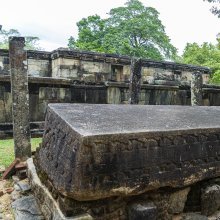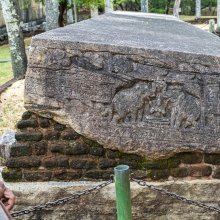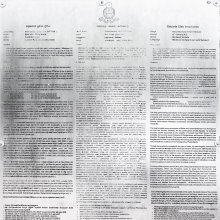Pota, Poṭa, Potā: 23 definitions
Introduction:
Pota means something in Buddhism, Pali, Hinduism, Sanskrit, the history of ancient India, Marathi, Hindi, biology, Tamil. If you want to know the exact meaning, history, etymology or English translation of this term then check out the descriptions on this page. Add your comment or reference to a book if you want to contribute to this summary article.
Pota has 22 English definitions available.
Alternative spellings of this word include Pot.
Images (photo gallery)
Languages of India and abroad
Sanskrit dictionary
[Deutsch Wörterbuch]
Source: Cologne Digital Sanskrit Dictionaries: Böhtlingk and Roth Grosses Petersburger WörterbuchPoṭa (पोट):—
1) m. a) Fundament eines Hauses (veśmabhūmi) [Jaṭādhara im Śabdakalpadruma] Vgl. pota . — b) das Zusammenlegen (saṃśleṣa) [Bharata] zu [Amarakoṣa] (bei der Erklärung von poṭagala) [Śabdakalpadruma] —
2) f. ā [Pāṇini’s acht Bücher 2, 1, 65. 3, 1, 17, Vārttika von Kātyāyana. 1.] a) Hermaphrodit [Amarakoṣa 2, 6, 1, 15.] [Hemacandra’s Abhidhānacintāmaṇi 532.] [Hārāvalī 130.] [Halāyudha 2, 275.] ibha [Pāṇini’s acht Bücher 2, 1, 65,] [Scholiast] — b) Dienerin (vgl. poṭaka, voṭā) [Hemacandra’s Abhidhānacintāmaṇi 534.] [Halāyudha 2, 337.] —
3) f. ī a) Mastdarm: ūvadhyaṃ purīṣādhānaṃ poṭīti prasiddham [Scholiast] zu [Pāraskara’s Gṛhyasūtrāṇi 3, 8.] — b) ein grosser Alligator [ŚABDĀRTHAK.] bei [Wilson’s Wörterbuch]
--- OR ---
Pota (पोत):—[Uṇādisūtra 3, 86.] [Pāṇini’s acht Bücher 7, 2, 9.] m. [Trikāṇḍaśeṣa 3, 5, 3.]
1) das Junge eines Thieres [Amarakoṣa 2, 5, 38. 3, 4, 14, 62.] [Hemacandra’s Abhidhānacintāmaṇi 338.] [Anekārthasaṃgraha 2, 181.] [Medinīkoṣa t. 38.] [Halāyudha 2, 347.] [UJJVAL.] vṛṣa [Harivaṃśa 3705.] Füllen [Halāyudha 2, 285.] ein zehnjähriger Elephant [Hemacandra’s Abhidhānacintāmaṇi 1219.] nāga [Harivaṃśa 12744.] pakṣi [Kathāsaritsāgara 12, 133.] kalahaṃsa [Spr. 2520.] von jungen Bäumen: druma [Harivaṃśa 3478.] śāla [Mahābhārata 3, 11690. 7, 2504.] [Hiḍimbavadha 2, 18.] pūga [Bhāgavatapurāṇa 4, 9, 54. 21, 3.] cūta [3, 21, 42.] śāka viell. eine best. Gemüsepflanze [Mārkāṇḍeyapurāṇa 59, 14.] —
2) Schiff, Boot [Amarakoṣa 3, 4, 14, 62.] [Hemacandra’s Abhidhānacintāmaṇi 876.] [Hemacandra’s Anekārthasaṃgraha] [Medinīkoṣa] [Hārāvalī 142.] [Halāyudha 3, 33.] [UJJVAL.] bhinna (baṇij) [Mahābhārata 7, 2522.] dharmapotena saṃtara [12, 12061.] potaiḥ pavanavikṣiptaiḥ [Harivaṃśa 3530. 8363] (neben yānapātra). [Spr. 1823.] [Varāhamihira’s Bṛhajjātaka S. 47, 12.] cyuta [Hitopadeśa III, 51.] [Rājataraṅgiṇī 4, 503.] bhavasindhu [Bhāgavatapurāṇa 3, 21, 14. 4, 23, 39.] [Mārkāṇḍeyapurāṇa 92, 26.] [Śatruṃjayamāhātmya 14, 194. 196.] neutr. [Kathāsaritsāgara 26, 116.] —
3) Kleid, Gewand [Medinīkoṣa] [Halāyudha 2, 393.] —
4) Fundament eines Hauses (vgl. poṭa) [Medinīkoṣa] —
5) ein Fötus ohne Eihaut, = jarāyurahito garbhaḥ [Hemacandra’s Abhidhānacintāmaṇi 1355]; eine zur Erkl. von potaja angenommene Bedeutung. — Vgl. mūlapotī .
--- OR ---
Pota (पोत):—
1) [Sp. 883, Z. 1. fg.] nyagrodha [Bhāgavatapurāṇa 12, 9, 20. Z. 2. fg.] śākapota junges Gemüse als Name eines Volkes [Mārkāṇḍeyapurāṇa 59, 14.] —
2) n. [Kathāsaritsāgara 67, 101.]
Source: Cologne Digital Sanskrit Dictionaries: Sanskrit-Wörterbuch in kürzerer FassungPoṭa (पोट):——
1) *m. — a) Fundament eines Hauses. — b) das Zusammenlegen. —
2) *f. ā — a) Hermaphrodit. — b) Dienerin. —
3) f. ī — a) Mastdarm. — b) *ein grosser Alligator.
--- OR ---
Pota (पोत):——
1) m. — a) Thierjunges. zu belegen nur in Comp. mit einem Thiernamen. — b) in Comp. mit einem Pflanzennamen ein junger Schössling , ein junger —. — c) *Kleid , Gewand. — d) *Fundament eines Hauses. — e) *ein Fötus ohne Eihaut. —
2) m. n. Schiff , Boot.
Sanskrit, also spelled संस्कृतम् (saṃskṛtam), is an ancient language of India commonly seen as the grandmother of the Indo-European language family (even English!). Closely allied with Prakrit and Pali, Sanskrit is more exhaustive in both grammar and terms and has the most extensive collection of literature in the world, greatly surpassing its sister-languages Greek and Latin.
See also (Relevant definitions)
Starts with (+195): Potababu, Potabahra, Potabanda, Potabandhanem, Potabanij, Potaberija, Potabha, Potabhanga, Potabhara, Potabharana, Potabhariya, Potabharu, Potabuda, Potaca, Potaca Adala, Potaca Gola, Potaca Paika, Potaca-gola, Potacaka, Potacchadana.
Ends with (+65): Ajapota, Ambabaica Pota, Ambabaica-pota, Anashavempota, Anashempota, Anushempota, Arnavapota, Ashvapota, Aspota, Bharapota, Bhumispota, Bhutalapota, Bumdatipota, Calaippota, Candapota, Casimiroa sapota, Chikku sapota, Chirpota, Cipota, Cirapota.
Full-text (+206): Potha, Ibhapota, Potacchadana, Potabhanga, Potavaha, Potaraksha, Vatapotha, Potagala, Potadhana, Potaplava, Potaka, Potaya, Karipota, Vota, Potay, Potabanij, Potatva, Potadharin, Potara, Phota.
Relevant text
Search found 31 books and stories containing Pota, Poṭa, Potā, Pōtā, Pōta, Poṭā, Pōṭā, Pōṭa, Pō-tā, Po-ta, Potha, Pothaa, Paothaa, Poda, Podha, Paotha; (plurals include: Potas, Poṭas, Potās, Pōtās, Pōtas, Poṭās, Pōṭās, Pōṭas, tās, tas, Pothas, Pothaas, Paothaas, Podas, Podhas, Paothas). You can also click to the full overview containing English textual excerpts. Below are direct links for the most relevant articles:
Rig Veda (translation and commentary) (by H. H. Wilson)
The history of Andhra country (1000 AD - 1500 AD) (by Yashoda Devi)
Part 5 - Pota II (A.D. 1199-1230) < [Chapter III - The Chagis (A.D. 1100-1477)]
Part 3 - Pota I (A.D. 1161-1190) < [Chapter III - The Chagis (A.D. 1100-1477)]
Part 7 - Manma Pota and Manma Ganpaya (A.D. 1257-1268) < [Chapter III - The Chagis (A.D. 1100-1477)]
The Book of Protection (by Piyadassi Thera)
The Catu-Bhanavara-Pali (critical study) (by Moumita Dutta Banik)
Forms of expression < [Chapter 1 - Introduction]
Efficiency of Paritta (Buddhist protecting charms) < [Chapter 1 - Introduction]
(16) Dhajagga Sutta < [Chapter 2 - Subject Matter of the First Bhanavara]
Sahitya-kaumudi by Baladeva Vidyabhushana (by Gaurapada Dāsa)
Text 4.65 < [Chapter 4 - First-rate Poetry]
Text 10.1 [Upamā] < [Chapter 10 - Ornaments of Meaning]
Buddhist records of the Western world (Xuanzang) (by Samuel Beal)
Chapter 10 - Country of K’ie-po-ta-na (Kebud) < [Book I - Thirty-Four Countries]
Chapter 9 - Country of Mi-mo-ho (Maghian) < [Book I - Thirty-Four Countries]
Chapter 17 - Plants and Trees, Agriculture, Food, Drink and Cookery in India < [Book II - Three Countries]


